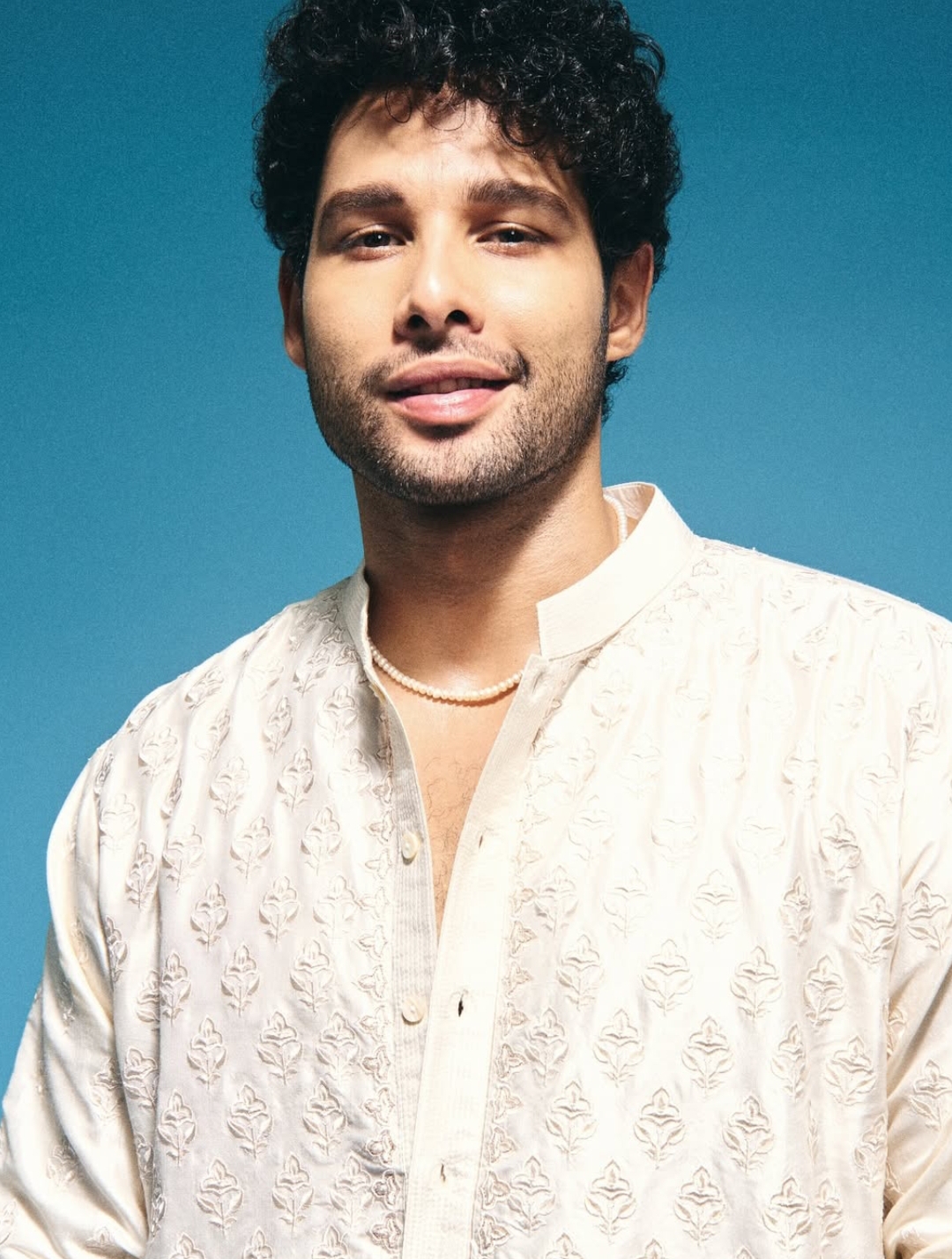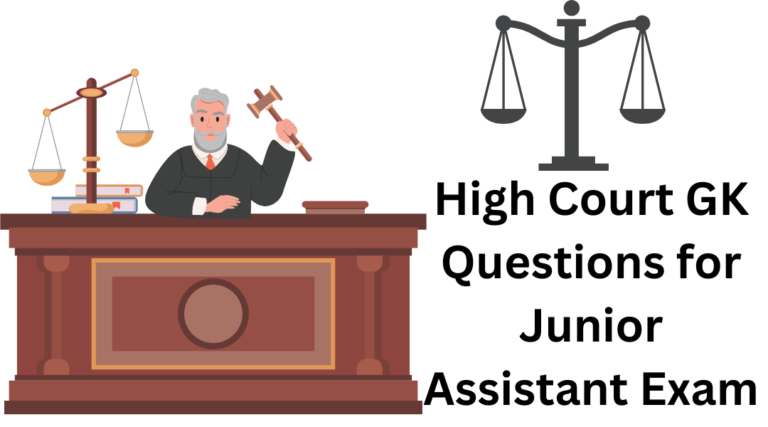The Junior Assistant exam for the High Court is a competitive test aimed at selecting individuals for administrative roles within the judiciary. It evaluates candidates across several subjects, including General Knowledge (GK), which plays a crucial role in securing a high score. GK questions typically cover a wide range of topics such as the Indian Constitution, history, geography, legal systems, and current affairs. In this blog post, we will provide 40 High Court GK multiple-choice questions (MCQs) to aid your preparation for the exam. These questions are designed to test your knowledge and ensure you’re ready for the exam.
High Court GK Questions for Junior Assistant Exam (MCQs)
1. Who was the first Chief Justice of India?
a) Justice K. Subba Rao
b) Justice Harilal Jekisundas Kania
c) Justice M. Patanjali Sastri
d) Justice S. Ramaswamy
Answer: b) Justice Harilal Jekisundas Kania
2. Which article of the Indian Constitution guarantees the Right to Constitutional Remedies?
a) Article 19
b) Article 21
c) Article 32
d) Article 15
Answer: c) Article 32
3. The High Court of which state was the first to be established in India?
a) Kerala
b) Kolkata
c) Mumbai
d) Chennai
Answer: b) Kolkata
4. What is the minimum age for appointment as a judge of the High Court?
a) 30 years
b) 35 years
c) 40 years
d) 45 years
Answer: b) 35 years
5. Who appoints the judges of the High Court?
a) Chief Justice of India
b) Prime Minister
c) President of India
d) Governor of the state
Answer: c) President of India
6. What is the tenure of the Chief Justice of India?
a) 5 years
b) 6 years
c) Until the age of 65
d) 10 years
Answer: c) Until the age of 65
7. Where is the headquarters of the Supreme Court of India?
a) New Delhi
b) Mumbai
c) Chennai
d) Kolkata
Answer: a) New Delhi
8. What is the maximum number of judges allowed in the High Court?
a) 25
b) 30
c) 40
d) It is decided by the President
Answer: d) It is decided by the President
9. In which year was the Indian Constitution adopted?
a) 1947
b) 1949
c) 1950
d) 1952
Answer: b) 1949
10. What is the main function of the High Court?
a) To frame laws
b) To hear appeals and administer justice
c) To represent the state in the Supreme Court
d) To make laws for the state
Answer: b) To hear appeals and administer justice
11. The Indian Penal Code (IPC) was drafted by which committee?
a) Law Commission of India
b) Indian Law Society
c) British Parliament
d) Constitutional Assembly
Answer: a) Law Commission of India
12. Who is the longest-serving Chief Justice of India?
a) Justice P. B. Gajendragadkar
b) Justice M. Hidayatullah
c) Justice Harilal Jekisundas Kania
d) Justice Y. V. Chandrachud
Answer: d) Justice Y. V. Chandrachud
13. Who was the first woman judge of the Supreme Court of India?
a) Justice R. S. Pathak
b) Justice M. Fathima Beevi
c) Justice Indu Malhotra
d) Justice Ruma Pal
Answer: b) Justice M. Fathima Beevi
14. Which act laid the foundation for the establishment of High Courts in India?
a) Government of India Act 1858
b) High Courts Act 1861
c) Indian Independence Act 1947
d) Indian Council Act 1861
Answer: b) High Courts Act 1861
15. Which language is primarily used for the proceedings in Indian courts?
a) Hindi
b) English
c) Bengali
d) Marathi
Answer: b) English
16. What is the full form of PIL, and how is it related to the judicial system?
a) Public Interest Litigation
b) Personal Interest Litigation
c) Public Individual Lawsuit
d) Private Interest Lawsuit
Answer: a) Public Interest Litigation
17. Which article of the Indian Constitution deals with the establishment of the High Court?
a) Article 214
b) Article 218
c) Article 226
d) Article 19
Answer: a) Article 214
18. Who was the first woman Chief Justice of a High Court in India?
a) Justice M. Fathima Beevi
b) Justice Leila Seth
c) Justice Ruma Pal
d) Justice Indu Malhotra
Answer: b) Justice Leila Seth
19. What is the jurisdiction of the High Court?
a) Original jurisdiction
b) Appellate jurisdiction
c) Advisory jurisdiction
d) All of the above
Answer: d) All of the above
20. What is the age limit for candidates appearing for the Junior Assistant exam in High Court?
a) 21 to 35 years
b) 18 to 32 years
c) 18 to 40 years
d) 25 to 45 years
Answer: a) 21 to 35 years
21. Which article of the Indian Constitution guarantees the Right to Equality?
a) Article 14
b) Article 19
c) Article 21
d) Article 16
Answer: a) Article 14
22. What is the main role of the Law Commission of India?
a) Drafting the Constitution
b) Giving legal advice to the government
c) Giving legal advice to the judiciary
d) Implementing laws
Answer: b) Giving legal advice to the government
23. Which part of the Indian Constitution deals with the Judiciary?
a) Part IV
b) Part V
c) Part VI
d) Part VII
Answer: b) Part V
24. Who is known as the Father of the Indian Constitution?
a) Jawaharlal Nehru
b) Dr. B.R. Ambedkar
c) Mahatma Gandhi
d) Sardar Vallabhbhai Patel
Answer: b) Dr. B.R. Ambedkar
25. The High Courts Act was enacted in which year?
a) 1858
b) 1861
c) 1947
d) 1950
Answer: b) 1861
26. Which of the following states does not have a High Court?
a) Punjab
b) Jammu & Kashmir
c) Assam
d) Haryana
Answer: b) Jammu & Kashmir
27. The first woman judge of a High Court in India was appointed in which state?
a) Gujarat
b) Himachal Pradesh
c) Kerala
d) Rajasthan
Answer: b) Himachal Pradesh
28. Which of the following is not a part of the judiciary system?
a) District Courts
b) Sessions Court
c) Civil Court
d) Indian Parliament
Answer: d) Indian Parliament
29. Which act governs the establishment of the Supreme Court of India?
a) The Supreme Court Act 1947
b) The Indian Independence Act 1947
c) The Constitution of India
d) The Government of India Act 1935
Answer: c) The Constitution of India
30. Which of the following can be appealed in the High Court?
a) Civil cases
b) Criminal cases
c) Administrative decisions
d) All of the above
Answer: d) All of the above
31. Which body can remove a judge of the High Court?
a) President of India
b) Parliament
c) Supreme Court
d) Governor of the state
Answer: b) Parliament
32. Who appoints the Chief Justice of the High Court?
a) Chief Justice of India
b) President of India
c) Governor of the state
d) Parliament
Answer: b) President of India
33. What is the highest judicial authority in India?
a) High Court
b) District Court
c) Supreme Court
d) Family Court
Answer: c) Supreme Court
34. Who can file a Public Interest Litigation (PIL)?
a) Only a lawyer
b) A person in public interest
c) The government
d) Any person who is affected
Answer: b) A person in public interest
35. Which of the following is not a fundamental right under the Indian Constitution?
a) Right to Equality
b) Right to Freedom of Speech
c) Right to Property
d) Right to Information
Answer: d) Right to Information
36. What is the retirement age for a High Court judge?
a) 60 years
b) 62 years
c) 65 years
d) 70 years
Answer: c) 65 years
37. Which of the following courts has original jurisdiction over disputes between states?
a) District Court
b) High Court
c) Supreme Court
d) Sessions Court
Answer: c) Supreme Court
38. Which of the following can be issued by a High Court?
a) Writs
b) Bills
c) Ordinances
d) None of the above
Answer: a) Writs
39. The Chief Justice of India is appointed by the President under which article?
a) Article 124
b) Article 126
c) Article 214
d) Article 230
Answer: a) Article 124
40. Which body is responsible for the judicial appointments in India?
a) Judicial Appointments Committee
b) Parliament
c) Union Cabinet
d) President of India
Answer: a) Judicial Appointments Committee
41. Which of the following is not a power of the High Court?
a) To issue writs
b) To hear appeals from lower courts
c) To make laws for the state
d) To review the constitutionality of laws
Answer: c) To make laws for the state
42. Who was the first woman lawyer to practice in the Supreme Court of India?
a) Indira Jaising
b) Fali S. Nariman
c) Cornelia Sorabji
d) Meenakshi Arora
Answer: c) Cornelia Sorabji
43. Which article of the Indian Constitution provides for the establishment of the Supreme Court?
a) Article 124
b) Article 216
c) Article 20
d) Article 32
Answer: a) Article 124
44. Who was the first woman Chief Justice of the High Court?
a) Justice Leila Seth
b) Justice Ruma Pal
c) Justice M. Fathima Beevi
d) Justice Indu Malhotra
Answer: a) Justice Leila Seth
45. What is the primary function of a High Court?
a) To draft laws for the state
b) To pass orders related to criminal cases
c) To hear appeals and review cases from lower courts
d) To enforce fundamental rights
Answer: c) To hear appeals and review cases from lower courts
46. In which year was the first woman judge appointed in the Supreme Court of India?
a) 1989
b) 1991
c) 2001
d) 2003
Answer: b) 1991
47. Which state has the largest number of High Courts in India?
a) Uttar Pradesh
b) Maharashtra
c) Tamil Nadu
d) Rajasthan
Answer: a) Uttar Pradesh
48. Which of the following is a writ issued by the High Court to direct a lower court or authority to perform its duty?
a) Habeas Corpus
b) Certiorari
c) Mandamus
d) Prohibition
Answer: c) Mandamus
49. Which High Court has jurisdiction over the state of Nagaland?
a) Guwahati High Court
b) Bombay High Court
c) Calcutta High Court
d) Delhi High Court
Answer: a) Guwahati High Court
50. Who was the first Chief Justice of the Delhi High Court?
a) Justice S. Muralidhar
b) Justice A. N. Ray
c) Justice Harbans Lal
d) Justice G. S. Sistani
Answer: b) Justice A. N. Ray
General Knowledge (GK) is a critical part of the Junior Assistant exam for the High Court, and practicing MCQs like the ones listed above will help you strengthen your knowledge of the judiciary system, laws, and current affairs. By thoroughly understanding these concepts, candidates can better prepare for the exam. Consistent practice of High Court GK questions, coupled with regular revision, will enhance your performance and give you an edge over the competition.
Good luck with your preparation! Keep studying, stay focused, and aim for success.
Also Read: Important Functional English MCQ with Answers
You may also like to Read This: MCQs on Geography of India for JKSSB JKPSI Exam

Sidhant Singh is a highly accomplished professional educator with a diverse academic background. He holds a Master’s degree in History, an MSc in Electrical Engineering and a PhD, demonstrating his extensive knowledge and expertise in both the humanities and the sciences. His unique combination of skills enables him to offer a well-rounded perspective in his teaching and research, making him a valuable resource for students across various fields.
